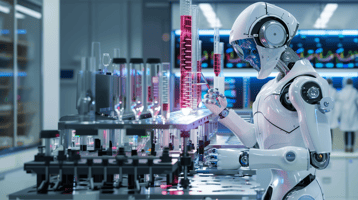As Artificial Intelligence (AI) takes prominence in the headlines and people begin to uncover the...
2023 has been a phenomenal year for artificial intelligence (AI), yet we’re only halfway through. As we uncover more about AI's possibilities for society, we see more organizations taking on the creative challenge of innovative implementation of machine learning and how this can be manipulated to solve various pain points across healthcare and life sciences. Join us as we look back at some of the hot topics and trends surrounding AI from the past six months and developments for the near future.
1. Telemedicine
Since the pandemic, the medical industry has embraced the increased demand for telehealth to meet restrictions and isolation demands. As the healthcare industry embraces AI within telehealth, we now see it being utilized to continue providing patients with top-notch care through virtual consultations and remote monitoring. This allows medical professionals to manage routine health and recovery monitoring, freeing valuable time to focus on complex cases and emergencies.
Mobile health (m-health) platforms are a cornerstone of telehealth, offering various healthcare solutions that cater to different needs. These platforms collect information from other sources, including EMRs, medical images, wearables, devices, and smartphones. AI algorithms process this data to provide personalized recommendations and timely alerts based on medical history, symptoms, and other critical factors. Virtual health assistants and chatbots powered by natural language processing (NLP) further streamline the process, making disease diagnosis, health monitoring, and triaging processes more seamless and user-friendly.
In April 2023, the Defense Health Agency (DHA) announced they would create a data-centric, virtual-first health ecosystem to enhance military medicine. Technology and AI-driven insights aim to make healthcare more personalized, preventive, and accessible with virtual consultations, remote patient monitoring, and leveraging big data for better care. The DHA seeks to move towards a high-tech, high-touch approach, making patient care more efficient by leveraging data, technology, and patient-centered care to improve the overall healthcare experience for military personnel and beneficiaries worldwide.
2. Data Analytics
One of the significant digital trends in healthcare for 2023 is integrating AI and data analytics to enhance healthcare accessibility, affordability, and effectiveness. The AI healthcare market is projected to proliferate, reaching $14.6B in 2023, with a projected $102.7B over the next five years. To stay competitive, stakeholders are exploring AI applications in genomics, imaging, drug discovery, and diagnostics.
Imaging and diagnostics, particularly, offer lucrative growth opportunities for healthcare companies. Global organizations like Siemens, GE, and Philips Healthcare have already integrated AI into their medical imaging software to improve analysis and generate automatic reports for CT scans.
AI-driven applications like robot-assisted surgery, virtual nursing assistants, dosage error reduction, connected machines, and preliminary diagnosis boost patient care efficiency. Administrative workflow, fraud detection, and cybersecurity AI applications also enhance overall healthcare efficiency, reducing costs and increasing accessibility. Though the initial investment can be significant, healthcare AI technology pays for itself through cost savings, improved patient care, and quality of life.
3. Personalized medicine
AI's impact on personalized healthcare is remarkable, presenting a future where tailored, targeted care becomes a reality. Start-ups pioneering AI-driven solutions extract invaluable insights from genetic testing, health records, clinical trials, and research data, offering the promise of precision medicine. With AI's assistance, early disease detection, risk prediction, and treatment discovery for rare conditions become more attainable, revolutionizing patient care.
AI's prowess uncovers hidden patterns in wearables and medical devices, contributing to more efficient and effective healthcare practices. The empowerment of patients to take control of their well-being has become increasingly vital. In 2016, the U.S. annual cost of drug-related morbidity and mortality resulting from non-optimized medication was estimated to be $528.4 billion, demonstrating the catastrophic effect treatment mismanagement can have on society and the economy.
A study published in the American Heart Association (AHA) journals in 2022 explores a patient-centric approach to hypertension management. The research highlights the potential of combining a drug with software-as-a-medical-device (SaMD) to optimize drug dosages based on real-time patient feedback and closed-loop models of care. This personalized approach considers individual responses to medication, ensuring better outcomes by striking a balance between effectiveness and side effects, thus maintaining blood pressure control. Embracing such modern healthcare solutions relies on understanding each patient's unique response to treatment, acknowledging that one size does not fit all in medicine. As we continue to understand more about how AI can be revolutionized in personalized healthcare, we expect to see some exciting progress soon.
4. Hospital Management
Artificial intelligence is crucial in streamlining routine administrative tasks in hospital settings, including appointment scheduling, insurance claim processing, and optimizing medical inventory. This automation addresses worker shortages and staff allocation challenges and ensures consistent, efficient care for many patients. Moreover, start-ups leverage AI-powered predictive modeling and patient flow management to optimize resource utilization and hospital operations. AI-driven hospital management and supply chain optimization software offer targeted interventions and policies, ultimately enhancing the overall quality of care.
AI's significance in hospital management goes beyond administrative tasks, revolutionizing clinical decision-making and patient care. In 2023, we can expect to witness a surge in AI-powered virtual assistants, providing patients with easy access to medical information and simplifying appointment bookings. Predictive analytics will play a key role, enabling hospitals to proactively monitor patient health and identify potential issues, leading to better outcomes and reduced readmissions.
AI's analytical capabilities will optimize resource allocation, allowing hospitals to efficiently allocate staff and resources based on patient demand and improve overall operational efficiency. By embracing these AI trends, hospitals can elevate patient care, increase efficiency, and stay at the forefront of the healthcare landscape.
5. Expert Networks
With every study, there’s an inherent need for research, data, and the best insights from the top KOLs. Gone are the days of searching aimlessly for the information needed to lift your research project off the ground, or speaking to the same experts time after time thanks to outdated manual libraries and databases. Here at Techspert, we utilize AI to bring you the best quality insights you won’t be able to find anywhere else at high speeds.
Beyond this, we understand the process of research to development better than anywhere else, and we have leveraged our AI capabilities to meet this. With our new solution ECHO, we use AI to transcribe your calls, with summaries of different segments and topics, all for you.
We believe that AI should be something to work with, not to replace – hence why all our solutions are designed to help you manage your time and resources more effectively. Why not try it out for yourself and jump in on the AI healthcare revolution? Get in touch today to see how we can help!






